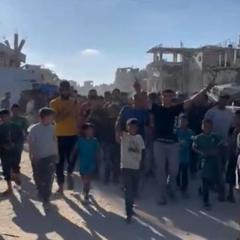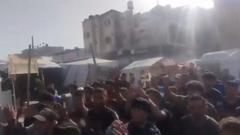Recent protests and statements highlight a shift in public sentiment, calling for an end to hostilities and a rescue of hostages.
Growing Dissent: Israeli Public Voices Concerns Over War Conduct

Growing Dissent: Israeli Public Voices Concerns Over War Conduct
As anger mounts, significant opposition emerges within Israel regarding the handling of the Gaza conflict.
As the conflict in Gaza escalates, discontent within Israel is intensifying. A notable dissent is voiced by Yair Golan, a leftist politician and former deputy commander of the Israel Defense Forces (IDF), who warned that Israel risks becoming a pariah state similar to apartheid-era South Africa if it does not cease its aggressive military tactics. He stated, "A sane state does not wage war against civilians, does not kill babies as a hobby." This criticism has sparked backlash from figures like Prime Minister Benjamin Netanyahu, who termed Golan’s comments as “blood libel,” reflecting a division in public discourse.
The conflict's devastating toll is becoming undeniably visible. Moshe Ya'alon, a former Israeli minister of defense, described the government's militaristic strategy as a means to retain power, warning of catastrophic consequences. Evidence of public sentiment shifting can be seen in recent polling, where 61% of Israelis expressed a desire to end the war and secure the safe return of hostages, starkly contrasting with the 25% who support further military engagement.
Despite these sentiments, Netanyahu continues to assert a commitment to annihilating Hamas and securing a definitive victory. Gershon Baskin, a former hostage negotiator, noted a prevailing sense of despair among many, especially families of hostages, who increasingly seek an end to hostilities to negotiate for their loved ones' return.
Protests have burgeoned in response to the ongoing violence, with anti-war marches occurring across Israel. Demonstrators displayed harrowing images of children killed in Gaza, calling for an immediate ceasefire. Led by the group "Standing Together," many activists are pressing the Israeli public to recognize the humanitarian crisis escalating in Gaza and its implications for Israeli soldiers and hostages alike. Amidst this protest culture, a counter-narrative persists, as certain factions within Israel maintain that the inhabitants of Gaza bear responsibility for their circumstances.
Internationally, response to the conflict is growing increasingly critical. The UK has imposed new sanctions on Israeli settlement groups and suspended discussions regarding a trade deal as Foreign Secretary David Lammy condemned Israel's military actions as "morally unjustifiable." Similarly, the EU is contemplating its long-standing agreements with Israel, signaling potential shifts in diplomatic postures borne of public outcry.
The landscape of domestic and international opinion is clearly shifting, as more voices in Israel are rising against the war and calling for a re-evaluation of action in Gaza.



















